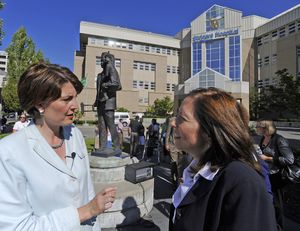McMorris Rodgers refuses to say environmental policy would address wildfires
At a downtown Spokane summit between Rep. Cathy McMorris Rodgers, Sen. Maria Cantwell and local firefighting officials this week, speakers spent a lot of time criticizing the lack of federal funding for prevention programs and the need for increased communication among agencies.
But little was said of the underlying extreme weather conditions that have given rise to two straight years of catastrophic fires in Washington.
In fact, the words "climate change" were only mentioned in passing by one speaker toward the end of the meeting.
President Barack Obama, visiting Alaska in September, linked that state's increasing fire season to man-made climate change.
"But the point is that climate change is no longer some far-off problem. It is happening here. It is happening now," Obama said in remarks in Anchorage on Sept. 1. "Climate change is already disrupting our agriculture and ecosystems, our water and food supplies, our energy, our infrastructure, human health, human safety -- now."
When asked after the roundtable whether legislators needed to address the environmental side of the state and country's growing wildfire problem, McMorris Rodgers was noncommittal. Listen to her answer below, and read the transcript.
KIP HILL: You know, there was one sort of statement in there about the weather, sort of being something we have to live with.
CATHY MCMORRIS RODGERS: Yes.
HILL: Like, this is the new normal. Is there something we can do in terms of environmental policy on this right now? I mean, are you even looking at that side? I don’t know.
MCMORRIS RODGERS: Well, it certainly makes it more difficult when you have hot and dry summers, preceded by a lower snow pack than we’ve had historically. Yeah, the conditions are more difficult on the ground and in the forest.
McMorris Rodgers acknowledged that conditions are more extreme than they've been in years past. But she didn't say that America should change its environmental policies to address the issue.
Her statement reflects a contentious history with environmental groups. The League of Conservation Voters, a left-leaning organization that advocates for policies to limit global warming and promote clean energy, has given McMorris Rodgers a lifetime score of 5 on a scale to 100 for her votes in Congress on their issues.
In April 2011, McMorris Rodgers voted in favor of a measure that limited the Environmental Protection Agency's ability to regulate greenhouse gas emissions. She joined a majority of her Republican colleagues alleging the EPA was stifling economic growth with overly burdensome regulations.
When asked a similar question, Cantwell - who scores a 90 on the Conservation League's scale - said her focus was on preparing for next year's major fire events, which are almost a certainty.
"What we want to do, is do the smart things we can right now to reduce the risk," she said. "You know, you can talk about what you want to do over the long run, if you get to decades of really dry, hot weather, and some of the challenges that we're going to face."
A recent study from U.S. Forest Service experts in Montana showed that the fire season was 18 percent longer in 2013 compared to 1979, and names climate change as "strong influence" on the increase.

